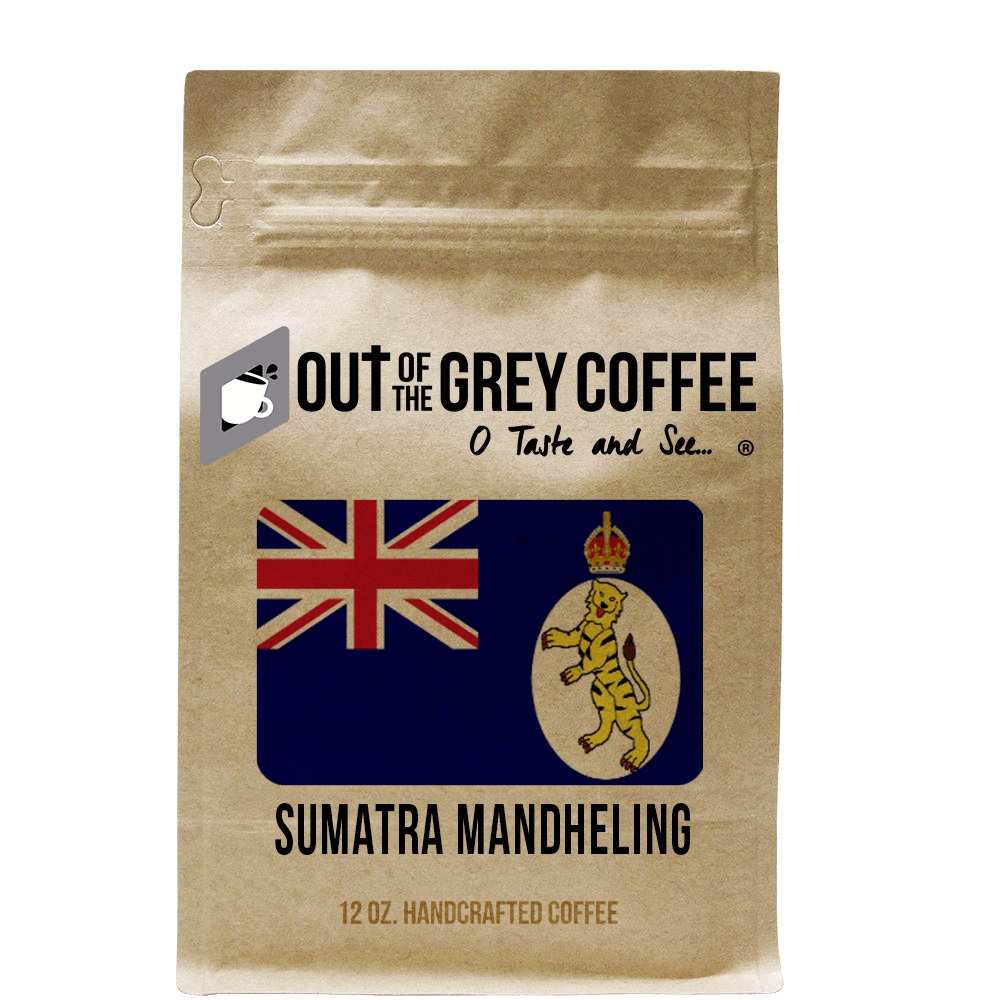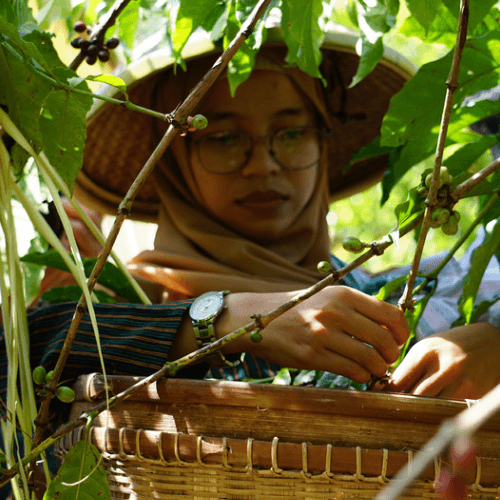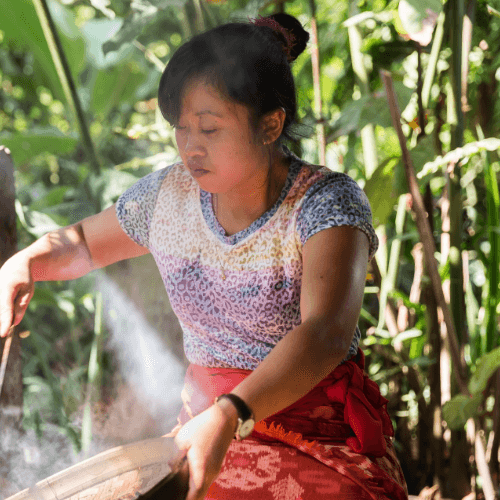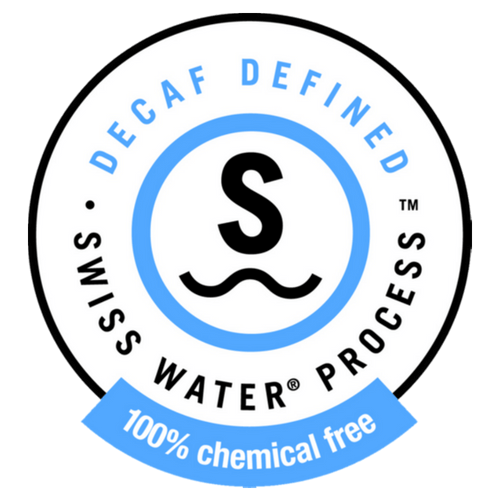




Single Origin - Sumatra Mandheling Ratu Ketiara Gayo - Women's Cooperative - Fair Trade Coffee
$22.99 - $23.97
Delightfully smooth, rich and full bodied, hints of marshmallow, low acidity with clean finish.
Perfect choice for coffee drinkers suffering from digestive issues, or those that just prefer low acidic coffees with a higher level of antioxidants.
100% delicious!
Roast: Dark Medium
Processing: Wet Hulled and Sun Dried
Altitude: 1200 -1600 M.A.S.L.
Harvest: March - January
12 oz. Handcrafted Fair Trade Coffee
Ratu Ketiara Gayo (RKG) is the Ketiara group’s newest business unit: a women’s cooperative established in 2017 and co-lead by three of Ms. Rahmah’s young protégés: Ms. Indayana as chairwoman; Ms. Dini as quality control; and Ms. Murul Kemala as treasurer. RKG represents a younger generation of farmers, 971 in total, 80% of whom are women, and all of whom are focused on top quality. Together RKG members farm a total of 1,234 hectares of coffee.
Aceh (pronounced AH-CHEY) is the northernmost province of Sumatra. Its highland territory, surrounding Lake Laut Tawar and the local city of Takengon, is considered to be the epicenter of one of the world’s most unique coffee terroirs due to its isolated heirloom set of typica and catimor-based cultivars, it’s uniquely fertile microclimates, land husbandry, and tradition of wet-hulled processing. Coffee farms in this area are managed with the experience of many generations of cultivation, while also harmoniously woven into their surrounding tropical forests. The canopies are loud and fields are almost impenetrably thick with coffee and fruit trees and vegetables, all of which are constantly flushing with new growth. Year-round mists and rain showers never cease, farm floors are spongy and deep with compost, and almost every square meter of the region seems to exude life. Nothing is ever still.
PT Ketiara is an umbrella group in this area that was founded in 2009 by Ms. Rahmah, who began in coffee as a local cherry collector more than 20 years ago, and who by now is one of Indonesia’s most respected coffee entrepreneurs. As a woman coming up in the male-dominated, largely conservative Muslim industry of Sumatra coffee, Ms. Rahmah learned to be assertive in negotiations, tend endlessly to the happiness of the farmers she represents, and to make her business a collective representation of the true gender diversity and talent of her community. The original cooperative was Fair Trade certified in 2011 and has grown from 38 original farmer members to almost 2000, and into multiple different sub-companies to service different qualities, processing styles, and certifications. Ms. Rahmah and her leadership team are in constant communication with their members. The price of coffee in Sumatra, while somewhat protected due to the limited supply of its terroir, is still extremely volatile between farmers and collectors, and the Ketiara group is as transparent with their farmers as they are with their buyers when it comes to navigating local cherry markets, exporter competition, and quality expectations.
Sumatra is a fascinating origin, unique even among its fellow Indonesian coffee-growing islands and areas. The vast diversity that have been found there is one of the exciting reasons that we are always happy to face cupping after cupping after cupping of Sumatran coffee in search of something special. Through this rigorous process we have discovered producers and developed partnerships with both individual farmer/collectors and cooperatives of various smallholders. We are also able to work with these partners to request (and pay more) more selective picking and processing, and we have undertaken several experiments with special-prep Wet-Hulling, to varying degrees of success.
We continue to pursue more and more special microlots and alternative processing methods, and we feel that there is a lot of untapped potential in this powerhouse producing region: Washed coffees in particular have grabbed our attention and our palates, as has the increase in democratically organized associations of women coffee producers.
HISTORY
Coffee was introduced throughout the islands of Indonesia by the Dutch in the 1600s, and was first exported by the Dutch East India Company in the early 1700s. Large Dutch-owned plantations were the norm, and the laborers and locals suffered financially and politically under the colonial regime: The 1860 novel Max Havelaar: Or the Coffee Auctions of the Dutch Trading Company outlined many of the ways that the Dutch government and landowners abused and oppressed the Indonesian people, specifically on Sumatra and Java. Poverty, starvation, and destitution were common among coffee workers and within the indigenous communities.
In the 1860s and 1870s, a coffee-leaf-rust epidemic decimated the coffee market in Indonesia, and led to the abandonment of many estates by the Dutch; as the plantations broke up, laborers took up small plots of the land, eventually replanting most of the old-stock Arabica with Robusta coffee and various more disease-resistant hybrids. This land redistribution created the predominance of smallholder growers on the islands, which exists to this day. Taken as a whole, Indonesia is the fourth-largest coffee-producing country in the world.
Sumatran coffees have long been distinct for their earthy, savory, somewhat vegetal or herbaceous characteristics, in part contributed by the climate and the mix of varieties grown, but also due to a specific post-harvest processing style called Wet-Hulling, or locally known as Giling Basah, which imparts much of the unique qualities these coffees have.
GILING BASAH
Before the 1970s, coffees in Sumatra were processed in the two most commonly found methods worldwide: washed and natural. In the 1970s, Japanese interest in Sumatran coffees led to the introduction of the Wet-Hulled process, a unique style of handling and drying that is largely responsible for Sumatran coffees’ unmistakable flavor characteristics, but also their normally greenish-blue hue.
In Sumatra, coffee farmers will typically harvest their coffee cherry and depulp it by hand at their farm or home, allow it to dry for a very short time, then bring it either to a coffee marketplace or directly to a “collector,” or collection point, where the beans are purchased at anywhere from 30–50% moisture, with their mucilage still partially intact. The coffee is then combined and hulled (has its parchment removed) while it is still in this high-moisture state. The coffee is then dried to the more commonly globally accepted 11–13% moisture in order to prepare for export.
While there is some experimentation currently being done with large-scale Washed coffee for export—currently much of the Washed coffee produced is for local consumption—the Wet-Hulled process was developed specifically to speed up drying and efficiency in a climate that sees heavy rain and clouds most of the year: Removing the parchment layer allows the coffee to dry much faster on patios or tarps even in these conditions.

